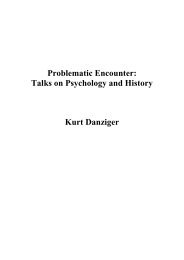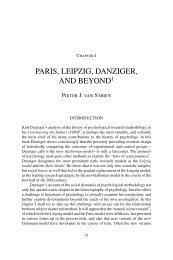The positivist repudiation of Wundt - Kurt Danziger
The positivist repudiation of Wundt - Kurt Danziger
The positivist repudiation of Wundt - Kurt Danziger
You also want an ePaper? Increase the reach of your titles
YUMPU automatically turns print PDFs into web optimized ePapers that Google loves.
THE POSITIVIST REPUDIATION OF WUNDT 219<br />
feeling,” and he believed that its very existence demonstrated that such feelings “lack the<br />
ability to be fixated verbally.” 59 Psychology, as usual, must therefore substitute the com-<br />
parative and historical study <strong>of</strong> mental products for the experimental study <strong>of</strong> individual<br />
reactions when dealing with complex mental processes. But even in an experimental<br />
study <strong>of</strong> simple cases <strong>of</strong> feeling, introspection plays a decidedly subordinate role.<br />
<strong>The</strong> weak point <strong>of</strong> the Machian or <strong>positivist</strong> philosophy <strong>of</strong> science was <strong>of</strong> course its<br />
naivetk in regard to the role <strong>of</strong> conceptual predispositions in the determination <strong>of</strong> ex-<br />
perience. It wanted to make experience the test <strong>of</strong> all conceptual categories, overlooking<br />
the fact that conceptual categories have a nasty habit <strong>of</strong> predetermining whatever enters<br />
experience. For example, Avenarius’s point <strong>of</strong> departure, the “factually given” (tat-<br />
siichlich vorgefunden) aspect <strong>of</strong> the “natural” view <strong>of</strong> the world, was no more factual and<br />
natural than any other aspect <strong>of</strong> experience ordered in terms <strong>of</strong> conceptual categories, as<br />
<strong>Wundt</strong> was quick to point out. Similarly, Titchener’s appeals to his (or his students’) in-<br />
trospective experience as though this constituted a final evidential basis free <strong>of</strong> all<br />
preconceptions strikes the modern reader, as it struck <strong>Wundt</strong>, as decidedly naive. A later<br />
generation was to attribute the weakness <strong>of</strong> Titchener’s foundations to his reliance on in-<br />
trospective experience. If “public” experience were substituted for the latter, the<br />
<strong>positivist</strong> ideal <strong>of</strong> a completely reliable, completely factual observational base could be<br />
attained. <strong>The</strong> behaviorist revolt did not question Titchener’s <strong>positivist</strong> ideals. On the con-<br />
trary, it adopted them with enthusiasm; it simply considered that the wrong path had<br />
been chosen to reach them. If we adopt the usual distinction between reformations that<br />
seek to change means and revolutions that involve a change <strong>of</strong> ends, then the switch from<br />
Titchenerian introspectionism to behaviorism must be characterized, not as a revolution,<br />
but as a reformation within the broader movement <strong>of</strong> <strong>positivist</strong> psychology.<br />
Turning from questions <strong>of</strong> method to the substantive issues in the analysis <strong>of</strong> feeling,<br />
the difference between <strong>Wundt</strong>, on the one hand, and Kiilpe, Titchener, and Ebbinghaus,<br />
on the other, came down to the questions <strong>of</strong> whether experiences <strong>of</strong> excitement-<br />
depression and tension-relaxation were to be regarded as aspects <strong>of</strong> feeling or were to be<br />
attributed to organic sensations. <strong>Wundt</strong> favored the former alternative, the Machian psy-<br />
chologists, the latter. Although Titchener actually seems to have believed that the issue<br />
could be decided empirically, it is obvious that we are dealing with a conceptual<br />
preference which expresses more fundamental commitments. One issue which is involved<br />
here is the centralist-peripheralist question to which we have already alluded in the con-<br />
text <strong>of</strong> the theory <strong>of</strong> apperception. <strong>Wundt</strong>, as has been noted, was wont to emphasize the<br />
role <strong>of</strong> central processes. Feeling was such a process, and in fact he regarded it as the<br />
product <strong>of</strong> the activity <strong>of</strong> the central apperceptive function.60 By greatly extending the<br />
scope <strong>of</strong> the affective process, beyond mere pleasure and pain, <strong>Wundt</strong> was, as usual, plac-<br />
ing the emphasis where he felt it belonged, in the sphere <strong>of</strong> central processes.<br />
By contrast, the urgent message <strong>of</strong> Mach’s Analysis <strong>of</strong> Sensations had been that the<br />
central experiencing, feeling, willing subject was a myth, that there was nothing there ex-<br />
cept combinations <strong>of</strong> sensations: “It is out <strong>of</strong> sensations that the subject is built up.” 61 In<br />
later editions Mach uses James’s theory <strong>of</strong> emotion to illustrate his point. <strong>The</strong> psy-<br />
chological thrust <strong>of</strong> Mach’s “antimetaphysical” stance was clear - complex central<br />
processes were not to be accepted as possessing an irreducible reality but were to be<br />
reduced to combinations <strong>of</strong> simple elements, which, in terms <strong>of</strong> the prevailing tradition,<br />
were identified with sensations: “Thus, perceptions, presentations, volitions, and<br />
emotions, in short the whole inner and outer world, are put together, in combinations <strong>of</strong><br />
varying evanescence and permanence, out <strong>of</strong> a small number <strong>of</strong> homogeneous elements.<br />
Usually, these elements are called sensations.” 62 Accordingly, sensations came to play a





